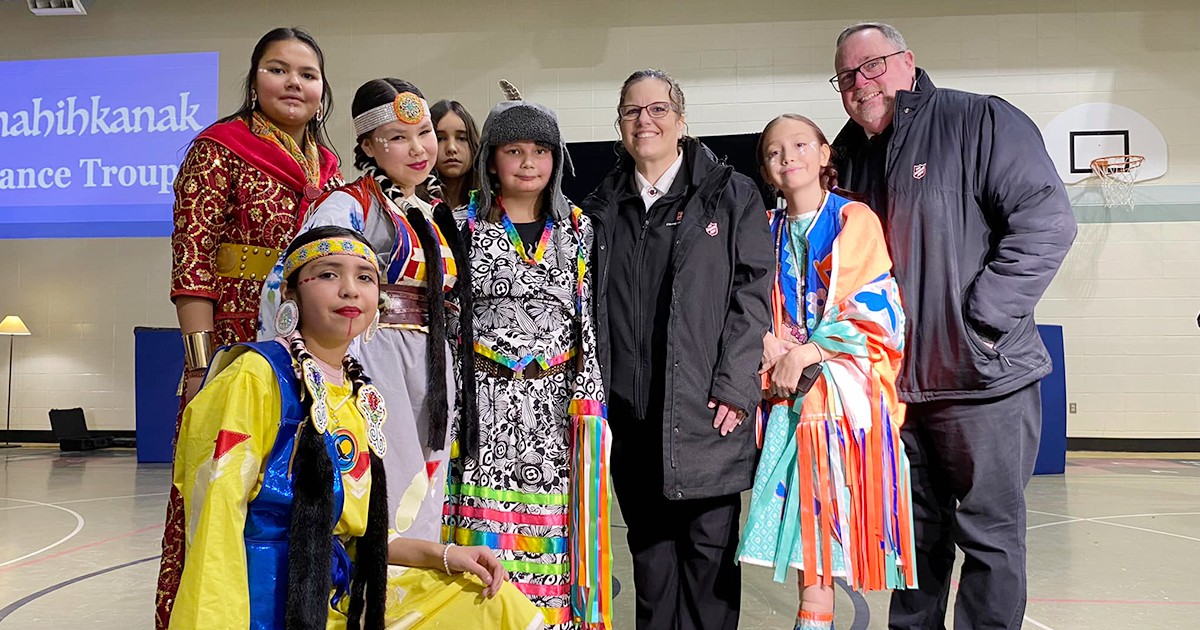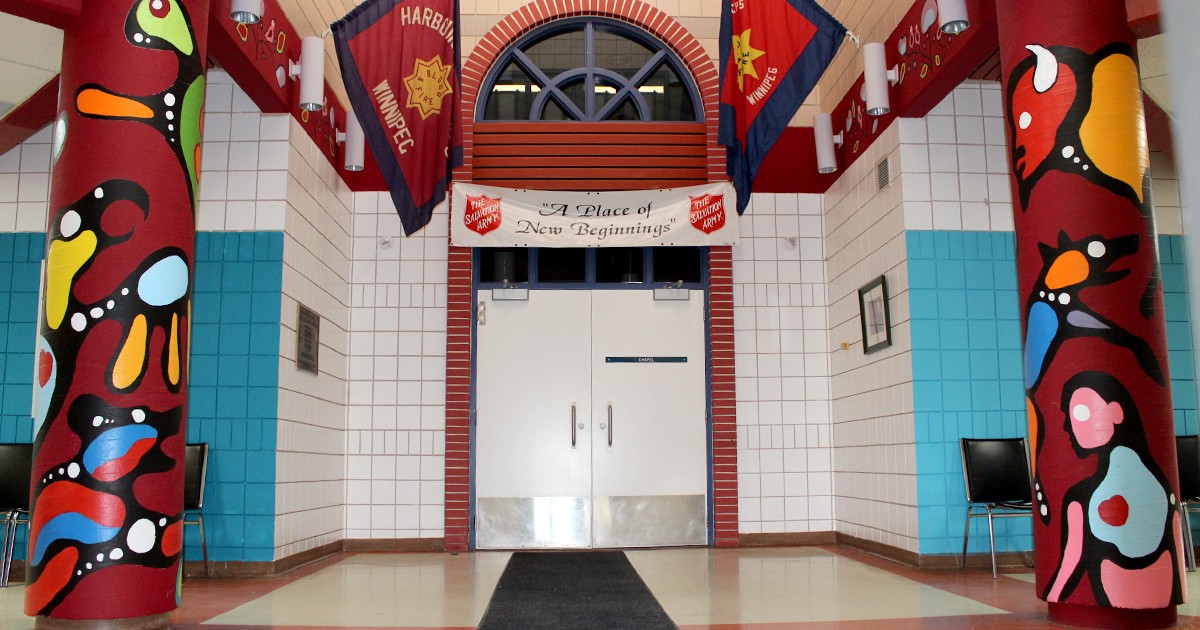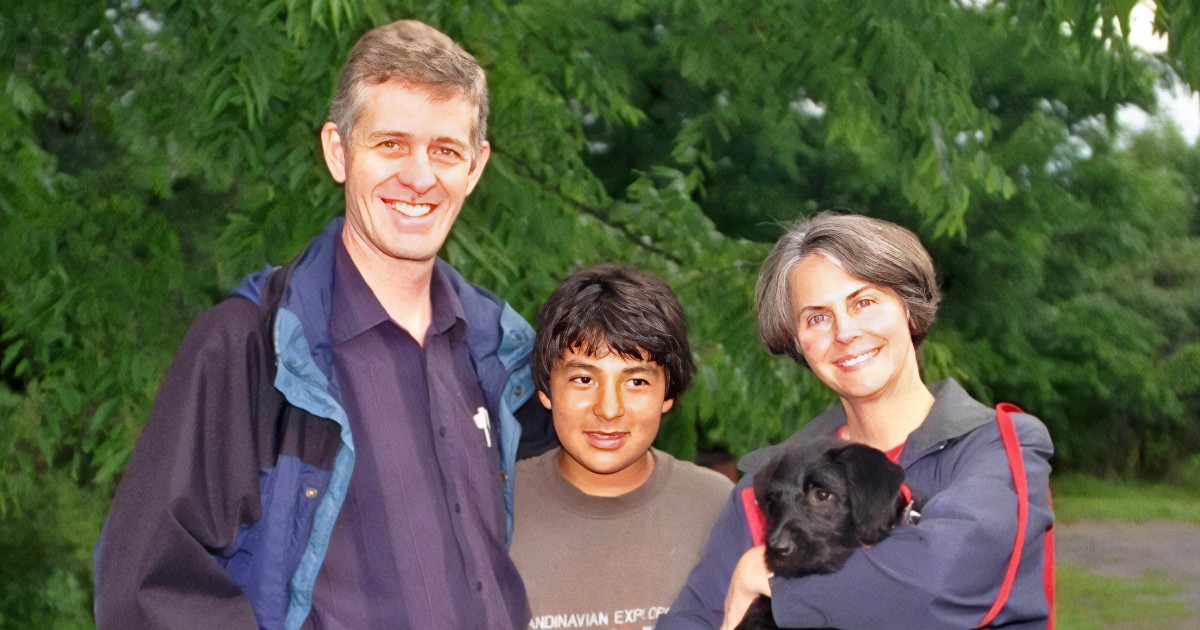(Above) “A Prayer for Love” from Prayers for the Creator’s Children, 2006, painted by Ovide Bighetty, commissioned by Indian Metis Christian Fellowship (IMCF), now known as Indigenous Christian Fellowship. Reproduction and exhibition rights belong with IMCF. Visit icfregina.ca for more information.
This article is adapted from a sermon shared by Major Shari Russell (Yellow Quill First Nation), territorial Indigenous ministries consultant, at The Salvation Army’s third annual Celebration of Culture at Pine Lake Camp in Alberta last August. The Seven Sacred Teachings (or Seven Grandfather Teachings) are based on the Anishinaabe tradition, but are valued and practised by many Indigenous people. Reflected in Scripture, they are a guide to living in right relationships with All Our Relations—with Creator, with each other, with the land and with ourselves.
The story is told that Creator gave the Seven Grandfathers the responsibility to watch over the people. Life was hard and so the Grandfathers looked for a helper, someone who could be taught how to live in a good way with all of creation. Finally, they found a baby boy, pure enough to receive the teachings and bring these teachings to the people. Each Grandfather gave the young boy a gift: a teaching to share with all the people. Each one is associated with a specific direction, season, colour and animal, among other attributes.
Reconciliation is a difficult word. Some Indigenous people struggle with this word. As a follower of Jesus, I see beauty in the grace that reconciles us with our Creator, and then with one another. It is an incredible gift.
Reconciliation is a difficult journey. It is not a quick and easy process. It is not saying “I’m sorry” and expecting people to “get over it.” Reconciliation requires repentance, restitution, relationship and resilience.
One elder has said, “I appreciate you apologizing, but we don’t need your apologies. What we need is your resilience. It’s OK that you’re feeling weak, disoriented and unclear as to what to do. What’s not OK is that you quit because of those feelings. I need you to be resilient and to stick in the game and to walk alongside us who have no choice but to move forward.”
I have heard people say, “We have apologized for the Indian Residential Schools and the Sixties Scoop—what more do you want?” More than apologies, we need change.
Reconciliation is a relationship. Don’t settle for what you hear in the media or read in a book. Reconciliation means getting to know us. When asked, “How can we even begin to engage the sin against the First Nations of the Americas? Most people are too overwhelmed by the whole thing to even think about it,” Richard Twiss, co-founder of Wiconi International, responded, “Just be our friend. Come and talk to us. Get to know us. Get to know what makes us laugh and what makes us cry. And when you find out what we care about, then make our concerns your concerns. Make our struggles for justice your struggles for justice.”
Relationships are never easy, but the Seven Sacred Teachings help us navigate these relationships so we can live well together.
As I watch the sun rise in the east, I am reminded of Psalm 8: “When I look at your heavens, the work of your fingers, the moon and the stars that you have established; what are human beings that you are mindful of them, mortals that you care for them?” (Psalm 8:3-4 NRSV).
Reconciliation must begin with humility as we speak truth about the history of our nation: the greed for land, but also the arrogance of people who thought they knew better. Jesus demonstrated humility when he laid down his privilege and “emptied himself, taking the form of a slave, being born in human likeness” (Philippians 2:7 NRSV). Humility allows us to let go of power and control, and the systems that continue to maintain colonial ways of thinking and being.
Honesty—Journey to the South
Sitting through the events of the Truth and Reconciliation Commission, I was saddened by the defensive response of school administrators, teachers and church leaders, who said, “We had the best of intentions.” Today, similar defensive comments echo. The journey of honesty means that we see beyond personal culpability for the past to take responsibility in the present. In Genesis 32, Jacob had to come to grips with who he was and what he had done before he went to reconcile with his brother.
There is a difference between finding fault and taking responsibility. A person may be responsible for a situation even if it’s not their fault. “By taking responsibility as opposed to fixating on blame for our present reality, we have a wonderful opportunity to effect meaningful change,” as Commissioner Mark Tillsley, international secretary for the Americas and Caribbean Zone, wrote about The Salvation Army’s international gender equity task force.
As Indigenous peoples, we are asking people to take responsibility to do what is needed for reconciliation.
Respect—Journey to the West
The phrase All Our Relations speaks to the interconnectedness of creation. We can only live well together to the degree that we treat all creation with respect. This value is evident in Scripture, as important provisions and laws were made concerning the land and animals. The Year of Jubilee was intended to restore justice, respect and equity for those who had become marginalized.
Courage—Journey to the North
Reconciliation is not for the faint of heart or those easily discouraged. It takes courage to do what is right and advocate for justice. The Bear (Makwa) is the model of courage. Courage is a decision to act in the face of fear. Just as courage sleeps in Makwa through long winter months, it can lie dormant within us. It needs to be awakened. When there is a threat to her young, Makwa will not stop until they are safe. In our lives, courage is needed to transform those fears that might prevent us from living the life God has called us to live. “Be strong and courageous. Do not be afraid or terrified because of them, for the Lord your God goes with you; he will never leave you nor forsake you” (Deuteronomy 31:6).
Wisdom—Journey Up to the Sky
Wisdom is the synthesis of knowledge and experience that deepens our insight and understanding of relationships and the meaning of life. Observe your life and the lives of others to gain insight. Proverbs 1:7-9 (TLB) asks: “How does a [person] become wise? The first step is to trust and reverence the Lord! Only fools refuse to be taught. Listen to your father and mother. What you learn from them will stand you in good stead; it will gain you many honours.”
Truth—Journey Down to the Earth
The Anishinaabe refer to this land as “Turtle Island.” The turtle, slow-moving and strong, symbolizes truth. It does not rush ahead or presume. It is patient, realizing that sometimes change is slow. We learn truth from all creation as we observe the rhythms of nature and the elements around us. As Psalm 85:11 says, “Truth springs up from the earth, and righteousness smiles down from heaven” (NLT).
Reconciliation requires truth, which is the foundation of relationship. Our Elders knew it when they asked for the Truth and Reconciliation Commission. Truth is the groundwork for all that comes after. Continue learning the truth of our history and what continues to happen in the relationship with Indigenous peoples. In your eagerness to respond, be patient with your learning and allow it to change your perspective and understanding.
Love—Journey Within
Love is the central value that holds everything together and is central to reconciliation. We are called to love the Lord with all our heart, soul and mind, and our neighbour as ourselves. Love makes us whole, bringing healing to the fragmented or broken parts of our lives, including our relationships.
Corrie ten Boom, who was arrested and sent to a concentration camp for helping Jews escape the Holocaust, wrote about her encounter with a former guard after the war. He said he had become a Christian and asked for her forgiveness, saying, “To think that, as you say, [Jesus] has washed my sins away.”
She then writes: “Even as the angry vengeful thoughts boiled through me, I saw the sin of them … Lord Jesus, I prayed, forgive me and help me to forgive him … Give me your forgiveness … And so I discovered that it is not on our forgiveness any more than on our goodness that the world’s healing hinges, but on his. When he tells us to love our enemies, he gives along with the command, the love itself.”
Some of us have been hurt and have deep wounds. We may struggle when we hear the words of Jesus calling us to love our enemies. Others of us may be on the other side of that hurt or are seeking reconciliation in the midst of the messiness of our history. We may not know what to do or how to respond. The wisdom of the Seven Teachings can help us in these next steps. May we learn to walk gently with one another on this journey of reconciliation.










Ira Barrow MAJOR